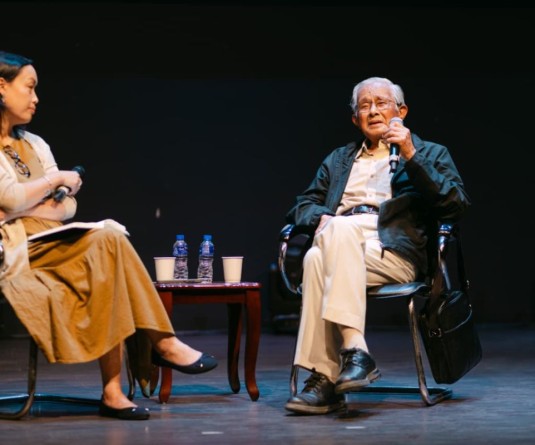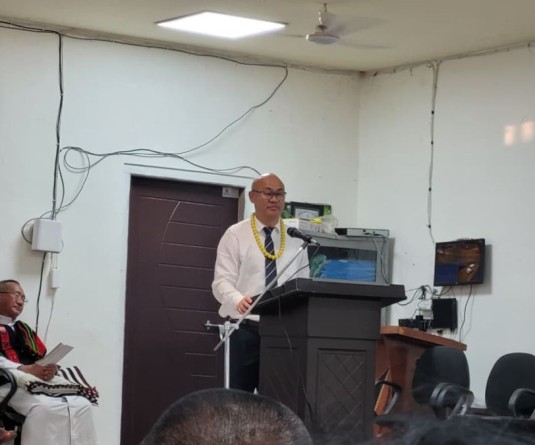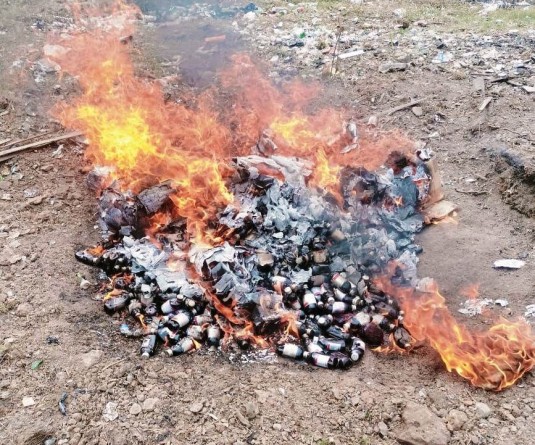
Deputy Commissioner Wokha, Rovilato Mor (front row, second from left) with other officials during the workshop on School Sanitation and Menstrual Hygiene held at Wokha on April 15. (DIPR Photo)
Wokha, April 17 (DIPR): A two-day workshop on School Sanitation and Menstrual Hygiene was held at Wokha from April 15 to 16, with Deputy Commissioner Wokha, Rovilato Mor as the chief guest.
To accelerate the school sanitation and hygiene education programme in the district of Wokha, this child-to-child interaction programme was initiated by Community Capacity Development Unit (CCDU) PHED, Government of Nagaland, which is a step in the right direction. The focus of this workshop is to involve the school children in augmenting the hygiene education programme in rural areas of Nagaland and to address the issue of menstrual hygiene management and behavioral change and communication on health and hygiene.
Speaking on the occasion, the chief guest said that cleanliness is next to godliness and to prevent diseases, one should give importance to sanitation issues as civilization sanitation is becoming more important. He also said that one should acknowledge the fact that menstrual hygiene, which we feel little, awkward to discuss about and to take up issues on such subjects is a physiological integrity part of our life, where every one should try not to keep the matter suppressed but free for discussion. The chief guest said that it is very relevant and important to impart this issue in schools and families and the participation of schools in such workshop. Schools and educational institution where we obtain education for better future should also be a centre for clean sanitation, mental and physical, the schools can be the best centre of sanitation where each and every student will be taught and imparted consciousness for maintaining sanitation, he added. Student’s sanitation consciousness can be transferred to each and every families and community for a better future, the DC said.
Resource person for the workshop was Roy Chowdhury, National Co-coordinator from the SULABH Sanitation Club, New Delhi. The inaugural function was chaired by E.E, PHED Wokha, Vihoto Achumi and vote of thanks was delivered by Er. Limathung, JE Wokha. Altogether, five Schools participated in the workshop.
To accelerate the school sanitation and hygiene education programme in the district of Wokha, this child-to-child interaction programme was initiated by Community Capacity Development Unit (CCDU) PHED, Government of Nagaland, which is a step in the right direction. The focus of this workshop is to involve the school children in augmenting the hygiene education programme in rural areas of Nagaland and to address the issue of menstrual hygiene management and behavioral change and communication on health and hygiene.
Speaking on the occasion, the chief guest said that cleanliness is next to godliness and to prevent diseases, one should give importance to sanitation issues as civilization sanitation is becoming more important. He also said that one should acknowledge the fact that menstrual hygiene, which we feel little, awkward to discuss about and to take up issues on such subjects is a physiological integrity part of our life, where every one should try not to keep the matter suppressed but free for discussion. The chief guest said that it is very relevant and important to impart this issue in schools and families and the participation of schools in such workshop. Schools and educational institution where we obtain education for better future should also be a centre for clean sanitation, mental and physical, the schools can be the best centre of sanitation where each and every student will be taught and imparted consciousness for maintaining sanitation, he added. Student’s sanitation consciousness can be transferred to each and every families and community for a better future, the DC said.
Resource person for the workshop was Roy Chowdhury, National Co-coordinator from the SULABH Sanitation Club, New Delhi. The inaugural function was chaired by E.E, PHED Wokha, Vihoto Achumi and vote of thanks was delivered by Er. Limathung, JE Wokha. Altogether, five Schools participated in the workshop.






